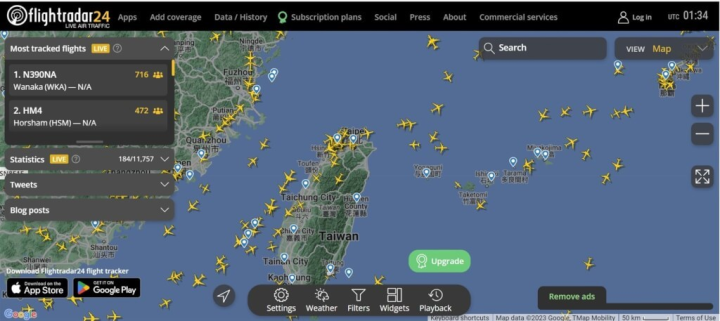
Taipei, April 16 (CNA) China launched a meteorological satellite from its north-central Gansu Province at 9:36 a.m. Sunday with some rocket wreckage later detected falling into a no-fly zone off the coast of northern Taiwan, which Taiwan's Ministry of National Defense said did not pose a safety threat.
The ministry said in a statement that Taiwanese forces monitored the whole process of the rocket launch through joint intelligence and surveillance.
The no-fly zone, located 85 nautical miles north of Taiwan and within the Taipei Flight Information Region, was marked out for a 27-minute period from 9:30 a.m. to 9:57 a.m. Sunday because of the possibility of falling rocket debris.
Flightradar24 maps showed that as of 10:10 a.m. Sunday, there had been no flights in the closed airspace as all civilian airlines had altered their routes to avoid the no-fly zone.
Air traffic in the no-fly zone was observed returning to normal at 10:20 a.m., according to the maps.
In addition, several airlines at Taiwan Taoyuan International Airport said their flight operations were normal on Sunday morning, while some passengers told CNA they were unaffected by the control measures.
China, which initially notified Taipei of a three-day no-fly zone to the north of Taiwan from April 16-18, revised the zone's duration to 27 minutes on Sunday morning after a protest by Taiwan's Ministry of Transportation and Communications, the ministry said in a statement Wednesday.
The no-fly zone was expected to affect about 33 flights to and from Northeast Asia and North America, according to the ministry.
China's Fujian Maritime Safety Administration also issued a navigation warning on Thursday, saying potential rocket debris would fall in the East China Sea on Sunday between 9 a.m. and 3 p.m. and banned shipping vessels from the area.
Earlier in the day, Chinese weather forecasting authorities said the launch of the Long March-4B rocket carrying the "Fengyun-3 G-Star" meteorological satellite had been completed at 9:36 a.m. from the Jiuquan Satellite Launch Center in Gansu.